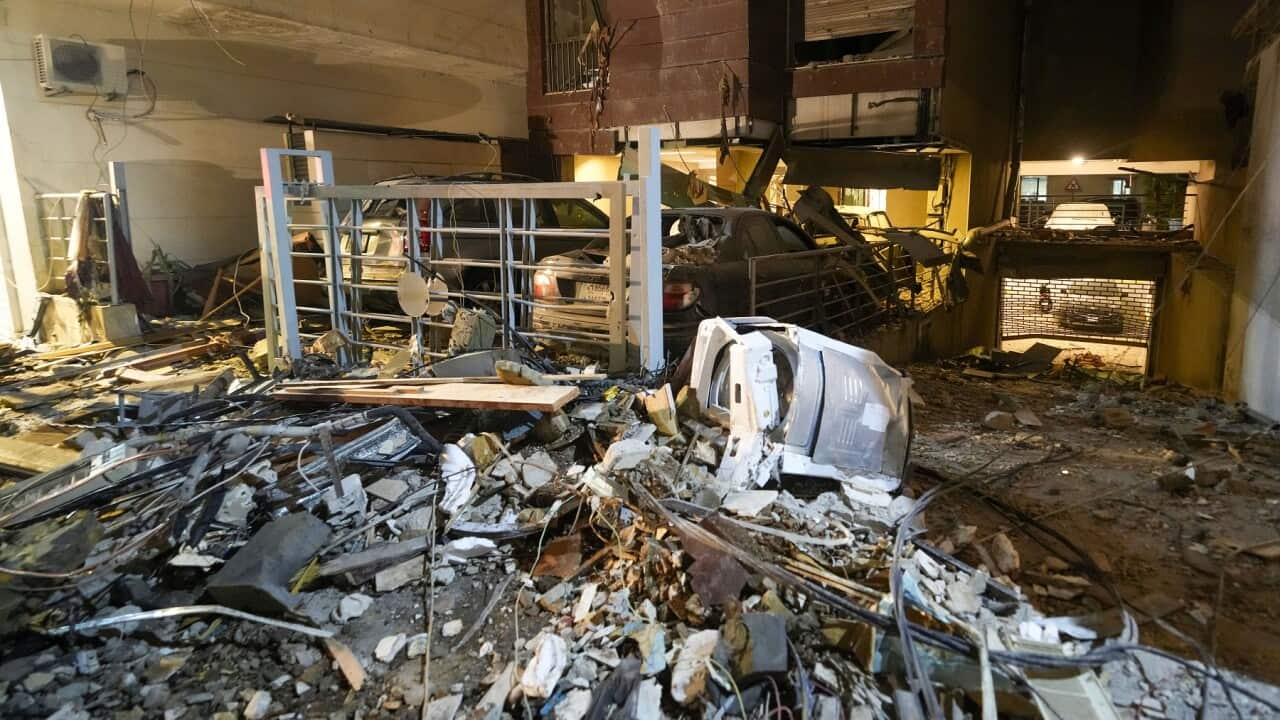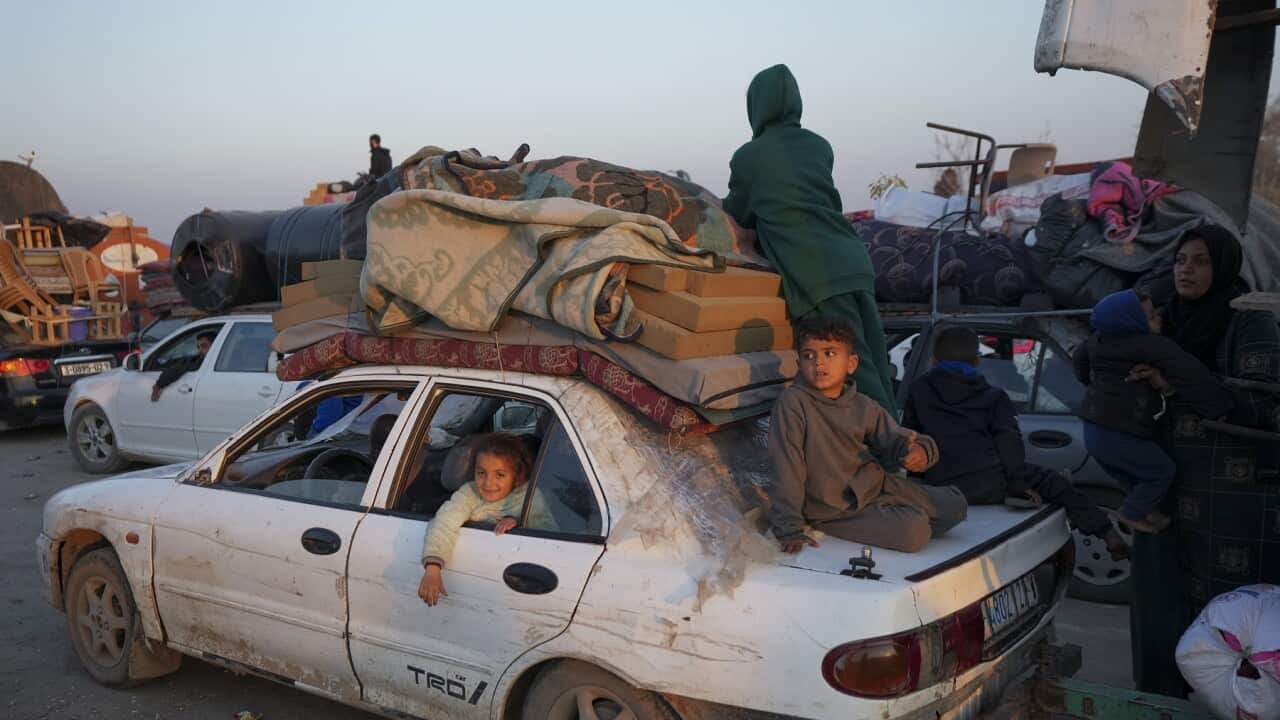TRANSCRIPT
Sirens in the Lebanese capital following Israeli airstrikes.
But this isn't in Beirut's southern suburbs —where Israel has been striking for weeks.
It's in the heart of the city, and locals say it came with no prior warning.
At least 22 people were killed and another 117 wounded, Lebanon's Ministry of Public Health says — after Israel hit the densely populated neighbourhoods of Nweiri [[na-WA-ri]] and Ras el-Nabaa.
A Lebanese security source, requesting anonymity, told A-F-P that Israel had attempted to kill a Hezbollah official who often frequented the targeted locations.
It's not yet clear if the official is among the dead.
United Nations Under-Secretary-General for Political and Peacebuilding Affairs, Rosemary DiCarlo, says Lebanon is facing a humanitarian emergency.
"The number of dead and wounded has spiralled. Over 300 people have been killed in Lebanon in just the past week, since 8 October last year, the number of dead is now over 2000, according to Lebanese Ministry of Health. Hundreds of those killed were civilians, including more than 100 children."
And concern within the United Nations is only escalating, as UN peacekeepers in Lebanon accused Israeli forces of firing at some of their positions.
The U-N Interim Force in Lebanon [[UNIFIL]] says two of their peacekeepers were wounded when an Israeli tank fired at a watchtower at the force's headquarters in Ras an-Naqoura [[rus an-na-KOO-ra]].
It claims Israeli forces had deliberately and repeatedly fired at its positions along the border.
Israel's military said in a statement that Hezbollah fighters operate from within and near civilian areas in southern Lebanon, including areas near UNIFIL posts.
U-N Under-Secretary-General for Peace Operations, Jean-Pierre Lacroix [[lah-CROY]], says the safety and security of peacekeepers is now increasingly in jeopardy.
"UNIFIL operational activities have virtually come to a halt since 23 September. Peacekeepers have been confined to their bases with significant periods of time in shelter. This severe impediment to the mission's freedom of movement within the area of operation has limited the mission's monitoring and reporting ability. The security environment has also presented challenges for the resupply of fuel, food and water for UN positions. The deconfliction of UNIFIL logistics movements remains paramount."
The force's 50 contributing countries had agreed to keep deploying more than 10,400 peacekeepers between the Litani River in the north and the U-N-recognised boundary between Lebanon and Israel — known as the Blue Line — in the south.
UNIFIL spokesperson Andrea Tenenti says it is one of the most serious events the group has witnessed in the last 12 months.
"So three incidents in a day, in 24 hours. This is highly concerning, not only because peacekeepers are there, but because this was done by, you know, most probably, a deliberate attack against our troops, which is a grave violation of international humanitarian law, and of course, of Security Council resolution 1701."
Security Council resolution 1701 gives UNIFIL a mandate to help the Lebanese army keep its southern border area with Israel free of weapons or armed personnel other than those of the Lebanese state.
But despite Israeli attacks and orders by Israel's advancing military to leave, Mr Tenenti says U-N peacekeepers are determined to remain at their posts.
"A few days ago, the IDF asked us to move from certain positions along the Blue Line. This is a known fact, and we have over 29 positions along the Blue Line, like the Irish in Maroun el-Ras, and we decided to stay. There was an agreement with all the troop contributing countries that it's important for the UN to be there, to fly the UN flag, and we continue to monitor the situation. We are there because the Security Council has asked us to be there. So we are staying until the situation becomes impossible for us to operate."
The attack has drawn widespread international condemnation.
The White House says the U-S was deeply concerned by the reports and is pressing Israel for details.
Italy condemned the attack, with Defence Minister Guido Crosetto saying it was not a mistake nor an accident, adding that he summoned the Israeli ambassador to demand an explanation of the attack.
France, Spain, Ireland, Turkiye and the European Union also condemned Israel’s attack — each expressing their concern for the international rule of law.
Meanwhile, an Israeli strike on a school-turned-shelter in Gaza's Deir el-Balah has killed at least 28 people, health officials say.
The strike hit the city where a million people have taken shelter after more than a year of bombardment.
A further warning was given to three hospitals in the north to evacuate.
Altaf Musani, Director of Health Emergencies Interventions for the World Health Organization [[W-H-O]], says health care in Gaza is suffering from repeated attacks – with at least 516 recorded since last October.
"At least 24,000 people are suffering from life changing injuries due to the conflict, with no access to rehabilitation or specialised care. We recently met a man who crafted his own prosthetic leg using a broken crutch and some burnt wood. While this speaks to the resilience of the people of Gaza, no one should have to be this brave."
Ramesh Rajasingham is the Director of the U-N Office For The Coordination Of Humanitarian Affairs [[O-C-H-A]].
He says essential conditions for effective aid operations are severely lacking or entirely absent, and Gaza has therefore become the most dangerous place in which the UN and its partners operate.
He adds Israel is to be held responsible — for decimating an already fragile health system in Gaza.
"Critical items are awaiting approval for entry. Our access is restricted. For example, yesterday, OCHA and the World Health Organisation tried to reach northern Gaza to support the Kamal Adwan hospital after Israeli authorities offered its immediate evacuation. And after receiving green light from the Israeli authorities for the mission, the team was forced to wait at a holding point for hours, and ultimately the mission had to be aborted."













